- Home
- Trevor Hoyle
Blind Needle Page 21
Blind Needle Read online
Page 21
Of course you have to
Don’t be stupid
She’s read the diary
She knows you did it
What if she loves me?
What if she does?
That didn’t stop you before
Why so squeamish
All of a sudden?
What’s one more?
Do it!
The woman, whose name is Diane, makes no move to resist as in the mirror’s oval reflection his hands slide about her throat. His thumbs press against the soft column of her windpipe. He smiles into her eyes, which, unsmiling, gaze back into his.
That’s right
Now increase the pressure
His fingers tighten, the thumbs dig deeper.
Diane watches him, her eyes starting to bulge. Crescents of moisture are cradled in each eye. His hands jerk in spasm and the moisture shakes loose, splashes on his wrists. But pity didn’t stop him last time. Last time pity drove him on. Her tears won’t stop him this time. They didn’t before.
His hands girdle her throat while her eyes gaze into his. But something is wrong.
Nothing is wrong
Just get on with it
She is supposed to be blind and yet isn’t blind.
What does it matter?
Kill her anyway
You’ve got a taste for it
Enjoy yourself
How can he kill her when she can see? When she can see him killing her? When she is supposed to be blind but isn’t blind and can see him with her eyes killing her? Isn’t that the whole point? Isn’t that why she begged him to kill her?
(Blindness = Emptiness = Nothing = No will = No urge = No future = No life)
How can he kill a blind woman who can see?
His hands slacken and fall away, leaving pale encircling marks of his fingers where the blood has been squeezed out. She swallows and massages the sides of her neck with her fingertips, blinking away the tears and even, incredibly, smiling at him through them, as if she has every reason in the world to smile at him in gratitude for having saved her life.
He listens for the voice to tell him what to do but the voice is silent. Only the blank hiss of static hums in his brain.
Suddenly he is freezing. His teeth start to chatter. He turns away from her in a self-defensive crouch and glimpses the other turning away in the oval mirror. Quickly he averts his eyes just as the other averts his. He cannot confront the other’s naked stare: to look into those haunted eyes would be to lift the stone and see the squirming mess beneath.
The woman (Diane) tries to speak; she has to clear her throat twice, and even then her voice is rusty.
‘Don’t turn away – look at yourself.’
He shakes his head dumbly. His head feels empty without the voice telling him what to do, to say, to think. He wanted to kill Holford, he remembers, but Holford is dead, a pale, bloated and scarred corpse on a mortuary slab. And with Holford dead the way ahead is blank, directionless, without purpose.
No future and no past: suspended in the limbo of the eternal present. The actual living moment screams in his ears, as if he can hear the molecules of air colliding and cannoning off each other.
He recoils as she comes towards him.
‘What’s the matter?’ Diane says.
He is staring at her. ‘You can see.’
‘Yes, I can see,’ she says evenly.
His throat is dry. ‘You’re not blind.’
‘No, I’m not blind.’
‘They told me … you were blind,’ he says hoarsely. ‘Why else would you want to die?’
‘I’m not your wife. Your wife is dead.’
‘My wife is dead,’ I hear him say, half-statement, half-question.
‘Yes. Remember that and keep on remembering. And the man you were, who you thought you were, is dead too. He’s lying on a mortuary slab somewhere. You’re free of him. Do you understand? You’re free of him forever!’
‘Smith … ?’
‘Both of them – Holford and Smith. You’re free of them both now. The police think it was Smith who died in the harbour, let them go on believing it—’
‘But then who am I?’ he asks her.
The attractive woman whose dark hair is streaked with grey takes his hand. She reaches out and tilts the oval mirror. ‘This is you. Come and look at yourself …’
He hesitates, but then I see him take a step forward, the woman holding his hand, and as he stands and looks at himself in the mirror, from below comes the tinkling cascade of breaking glass.
3
He follows Diane onto the landing, the boards creaking under their weight through the thin carpet. The hallway below is a black pit. Diane moves slowly down, testing each step, her knuckles white on the banister rail. She turns and mouths at him over her shoulder, ‘Somebody trying to break in. We must call the police.’
Since the sudden tinkling of glass there hasn’t been a sound from below, but now a thin whistling moan rises and falls as the wind forces itself through a gap under the front door. Outside in the night the full force of the wind batters at the house, howling in fury. It occurs to him that if someone else is creeping stealthily through the house it will be impossible to hear him.
Diane suddenly runs full tilt down the stairs and seizes the bald dome of wood at the foot of the stairs, using it to swing herself round in one movement to reach for the telephone on the small varnished table. She is dialling before the receiver reaches her ear. The dial whirrs back, taking its time, taking an age, taking forever. She dials again, her ear pressed to the receiver, and her eyes snap wide. She shoots a look at him, standing on the stairs above her, her lips drawn back, the cords of her neck standing out. The receiver slides from her ear. ‘The line’s dead. It’s been cut.’
In the dark hallway she stands completely still, straining to hear above the moaning of the wind. Her eyes are fixed on the door leading to the kitchen. Not taking her eyes off the door, she starts to move slowly backwards, beckoning to him.
As he comes down into the hallway her slow, tense movements are transformed into feverish activity as she rummages through the dense cluster of coats, hats and scarves on the large mahogany hatstand inside the front door, tearing them from their hooks and flinging them aside. He doesn’t know what to make of this behaviour, except to surmise that panic at the presence of an intruder has snapped her reason. Then he does understand as she thrusts a bundle of cloth into his hands – an overcoat – thick, coarsely-woven material, with wide, old-fashioned belt and metal buckle. Diane is pulling on an anorak with a fur-lined hood. ‘Let’s just get out, get away,’ she tells him in a rushed quivering whisper. ‘What the hell – let them have the bloody notebooks and tapes. What’s it matter?’
It doesn’t matter, not to him, because he doesn’t know what she’s talking about.
Yet the evidence of the clammy mist of sweat on his forehead and the trembling in his legs tells him he is infected by her fear. The intruder, whoever he is, threatens them both. They must get away from this house. As far as possible. He can’t imagine where to (he himself can’t think of a safe place) but he trusts this woman, whose name is Diane, to know of one, and to find it, and to make sure they get there.
He trusts her to deliver him from evil.
‘Run for the nearest door, on the passenger side,’ she is saying to him, sliding back the top bolt. ‘I think it’s unlocked – hope to God it is. And I hope the Japanese heap of rubbish starts first time. Are you ready? Right!’
He steps back as she swings the door open, tensing himself for the dash. But he doesn’t move straight away, too shocked by the sudden violence of wind flecked with ice-water whirling into the hallway. Diane also hasn’t moved. Her face has become ugly, stiffened into rigor mortis. She is staring down at a squat shape planted in the doorway, its hair plastered flat by the rain, water trickling down the broad face past the smirking mouth of square brown teeth and running freely from the dimpled chin like a torrent gushing down
a mountainside.
Still grinning, the fat boy raises a sodden bandaged hand as if in greeting. He jerks forward his other hand like a ramrod as the woman tries to slam the door in his face. And the hallway seems suddenly crowded with several people: two men have appeared through the kitchen door behind them, and during the scuffle and confusion the fat boy pushes his way in and kicks the front door shut, no longer smiling.
‘Ray – upstairs. Make sure there’s nobody else up there. Watch these two, Gaz,’ he instructs the other, who is short and thick-set, with sideburns that look stuck-on like strips of tar-paper.
‘Get out of this house!’ Diane yells at the fat boy, who pushes past her and kicks open the door to the front room, groping inside for the light switch. ‘What is this, a bloody stockroom?’
He stands frowning in the doorway, a puddle forming at his feet, his eyes flicking over the cardboard boxes stacked here and there and the piles of books spilling across the carpet. He reaches back and grabs a handful of the woman’s anorak and drags her in after him. When she struggles to resist he casually punches her in the stomach.
‘Let’s not fucking mess about now,’ the fat boy says in quite a reasonable tone. He looks down at the woman crouching at his feet, hugging the pain to herself, and kicks her in the side of the head. ‘You know what we want. Where is it?’
I hear a voice say, ‘Leave her alone,’ and the fat boy whirls round and sticks his finger under the man’s nose. ‘You, squire, have caused all the trouble you’re going to. Calling yourself Holford was a big mistake. Then you made an even bigger one when you took that briefcase. So come on, where is it?’ He looks down, eyes squinting under puffy eyelids, at the woman crouching on the floor. ‘I’m sure Mrs Locke would like you tell us where it is. Wouldn’t you’ – he kicks her again – ‘Mrs Locke?’
Ray darts into the room like a thin shadow. ‘Nobody upstairs. There’s just these two. We’re miles from anywhere. They can scream all they want.’ He sniggers loudly, tickled pink at a private joke, and without warning drives his bony fist into the man’s ribs. ‘Bastard!’
The fat boy is not amused. ‘Let ’em scream after. First I want dick-head here to tell us what he’s done with the briefcase. All right, squire?’ he says evenly, raising his foot to aim a kick at the woman on the floor.
‘Don’t hurt her,’ I hear the man say rather pitifully.
‘Then don’t piss me about. Where is it?’
The man shakes his head. He opens and closes his mouth soundlessly, like an actor who has walked into the wrong play and doesn’t know the lines. There is nothing in his head but an empty buzzing vacuum. He needs the director, Dr Morduch, to tell him who he is and what he ought to say. But the director doesn’t appear. And the play goes on. The curtain doesn’t come down. The silence stretches on and on, to breaking point … and by now it must be obvious to the audience that he’s dried.
If only he had the words he would say them, but he hasn’t been given any words to say.
The fat boy is staring up at him. ‘Spit it out, squire, before I spit you out.’ There is a febrile light in his eyes, his fleshy lips drawn back against brown teeth and red gums. But it’s not the man but the woman on the floor who speaks, or rather gasps something. Immediately the fat boy’s attention shifts. ‘You what?’ He pokes at her with his toe.
‘Behind the chair,’ she says through a mouth twisted with pain.
The fat boy pivots, pushing Ray aside, swoops down and with a growl of triumph hoists the attaché case into the light in both hands. He uses the case to sweep glasses and ashtray from the coffee table, slams it down and springs the clasps. His fat pale fingers paw through the contents. He pulls the gold-edged notebooks from their silk-lined compartments, then flicks open the micro-cassette recorder. Frowning and fumbling, he prises open the transparent plastic case containing seven tiny tapes. Now breathing heavily through his nostrils he examines each tape intently, dropping them one by one into the attaché case, and once again he picks up the recorder, peering into its empty tape compartment; finally he tosses it into the attaché case, muttering to himself.
‘What’s up?’ Ray asks unnecessarily. ‘Isn’t it there?’
The fat boy shoulders him aside and drops on one knee. He crouches over until his face is less then an inch from the woman’s face.
He says thickly, ‘You knew where the briefcase was so you must know where the tape is. And don’t ask which fucking tape. Where is it?’
The woman’s eyes cloud over, whether in pain or bewilderment it is impossible to know. She answers in the same weak, wincing voice, little gasping explosions in-between every sentence: ‘The tape was there. It was there. In the case. It must be there now.’
‘It isn’t.’
‘It must be.’
‘You’ve hidden it.’
‘No – no, I haven’t. I don’t want the damn thing. Take it.’
‘How can I take it when it’s gone?’
‘It was there. For God’s sake … I swear to you. In the case!’
‘It isn’t there now.’
The woman closes her eyes. She swallows and shakes her head.
The fat boy slowly gets up, just as slowly moving his head left and right to take in the dusty, cluttered room. He turns round and his eyes swivel back and forth along the rows of crowded bookshelves.
‘We’ve got all night,’ Ray says optimistically.
‘All night?’ the fat boy snarls. ‘We’d need a month of fucking Sundays to find anything in this pigsty. I think dickhead here knows where the tape is but he’s forgotten. He wouldn’t let this bitch get the shit kicked out of her and not spill it. But I’m going to make him. Oh yeh …’
‘I could break his arm,’ Gaz offers helpfully.
‘No. We’ll take him with us. I’ve got some prime stuff that’ll make him spill the lot. Everything right down to the crapstains on his underpants. Bring him. Move.’
‘What about her?’ Ray asks worriedly. ‘Are we leaving her?’
‘Yeh,’ the fat boy says softly, looking at his bandaged hand. ‘It’s him I want. Just him on his tod.’
Chapter Thirteen
1
I remembered raising my hand (that much I did remember) and looking at my reflection in the oval mirror of the varnished dresser, and then – nothing. The cold, bare room simply vanished, and Diane Locke vanished with it. Instead of standing in front of the mirror in the bare back room of Diane Locke’s house I was suddenly surrounded by a rushing, roaring blackness. For a panicky minute I thought I’d gone blind – but the blackness turned out to be countryside rushing past the windows, the roaring the noise of a car’s engine.
I was sitting in the back seat, wedged between Wayne’s gross bulk and a man with a thick neck and black sideburns, whose solid arm I could feel against the nape of my neck. I didn’t at first recognise the sharp profile of the man behind the wheel, until he glanced in the rearview mirror and I saw his eyes, the pupils black pinpricks, and realised it was Ray, the fat boy’s fellow junkie and hanger-about in men’s lavatories.
On the illuminated dashboard clock I could see that it was ten minutes to midnight. It had been no later than ten-thirty when I had gone upstairs to bed, and then sometime afterwards Diane Locke had come into the room. That’s when the blank patch occurred, a black hole in my memory, which left one hour unaccounted for. During that dead blank period Wayne and his chums had appeared – but that was the only thing I could be certain of.
What had happened to Diane Locke? Had they killed her? Then ransacked the house and found the tape, hidden behind Flight to Arras? I wasn’t sure about Diane Locke, but I guessed they hadn’t found the tape – in fact I knew it – because if they had I wouldn’t be here now, sitting in the back of a car speeding through the dark countryside, being taken to see Benson. That’s where they were taking me of course; there wasn’t any doubt in my mind.
I had mentally visualised Benson as having barricaded himself behind high walls fringe
d, with broken glass, and with extra barbed wire strung between iron stanchions leaning outwards at forty-five degrees. Foolish on my part – unnecessary on his. There was a full moon rising when we arrived and I saw the silhouette of a Norman church, square and solid against the pale wash of moonlight, and across the churchyard and a low flint wall, the house itself, craggy and grey and, if not ancient, then quite old. Benson had every reason to feel perfectly safe, tucked away in his old craggy house. He was rich, respected, a family man, businessman, councillor, a pillar of the community, and on top of all that living next door to God: what was there to fear?
The house was three storeys high, with miniature turrets on the two front corners, and some of the windows were of stained glass. To one side a single-storey annexe, possibly the kitchen, had been added later, built of the same rough grey stone or granite. There was a light in one of the upper windows, and as the car turned into the drive I saw a shadow pass across floral wallpaper.
Ray avoided the front door and stopped in the darkened lee of the house. Apparently this kind of nefarious business was relegated strictly to the tradesmens’ entrance. Murder, mayhem, coercion, blackmail, chicanery were on a par with the three black rubber dustbins and miscellany of cardboard boxes filled with empties lined up outside the kitchen annexe.
‘We’ll wait,’ Wayne said, ‘Check if it’s okay.’ There was just the faintest tremor of unease in Wayne’s voice, as if it had just occurred to him that he might have made a terrible blunder by bringing me here; but now it was too late, the deed was done.
Ray was gone for a couple of minutes. He appeared through the side door wearing a fretful expression on his narrow face and fluttering his fingers, beckoning urgently. He led the way inside, with the short, thick-set man close behind me, holding my arm to show who was in control, and Wayne following behind. In single file, like a prisoner under military escort on his way to a court martial, we marched through a large kitchen across an expanse of red quarry tiles between island units, everything white and stainless steel and clinical. The refrigerator was like a small garage, with double doors. An aluminium hood swooped down from the ceiling over the cooking range, ready to snatch away any disagreeable odours. Somewhere an electric motor hummed, discreet and well-behaved.

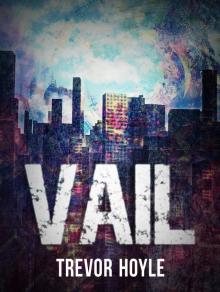 Vail
Vail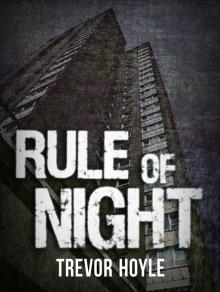 Rule of Night
Rule of Night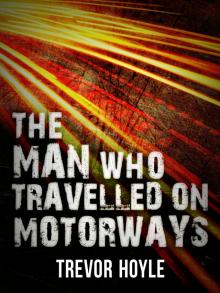 The Man Who Travelled on Motorways
The Man Who Travelled on Motorways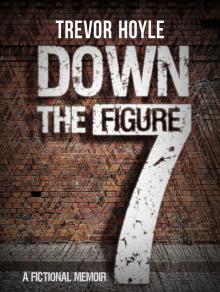 Down the Figure 7
Down the Figure 7 The Gods Look Down
The Gods Look Down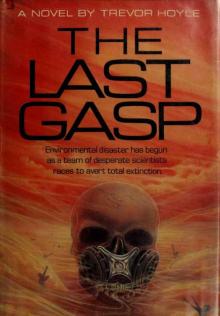 Last Gasp
Last Gasp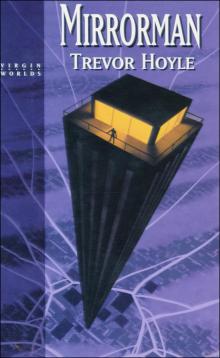 Mirrorman
Mirrorman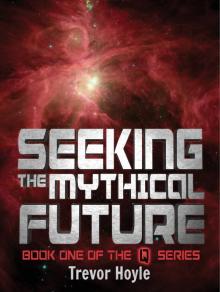 Seeking the Mythical Future
Seeking the Mythical Future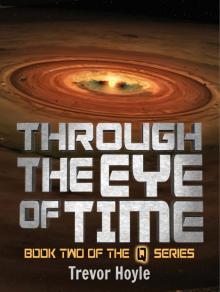 Through the Eye of Time
Through the Eye of Time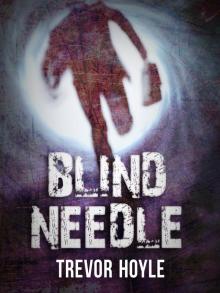 Blind Needle
Blind Needle Earth Cult
Earth Cult